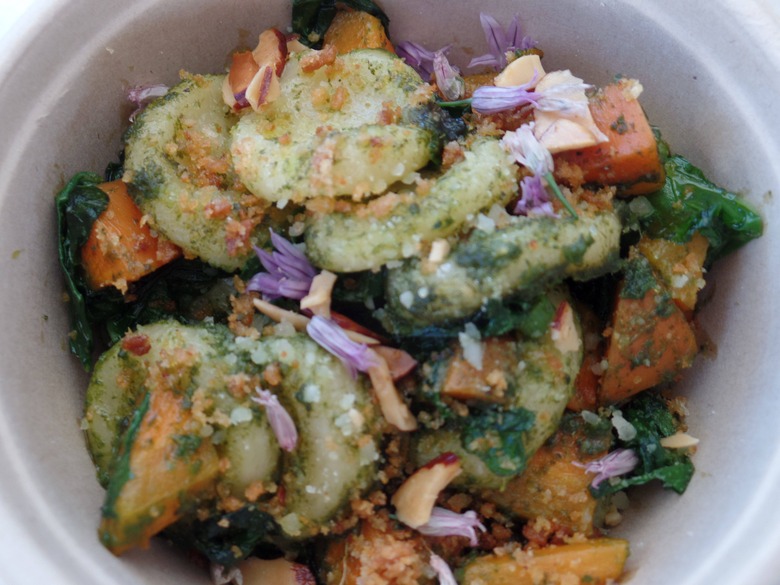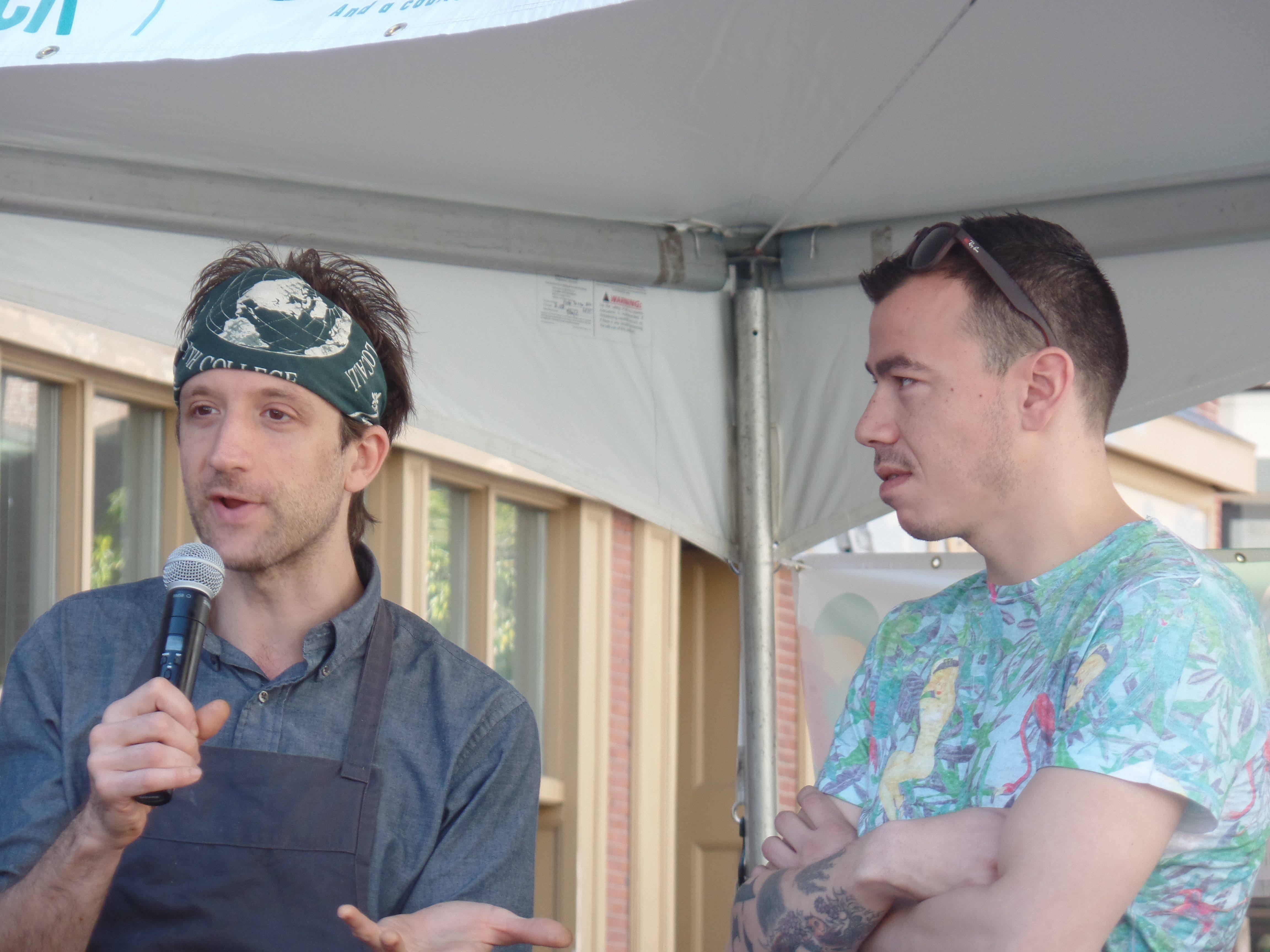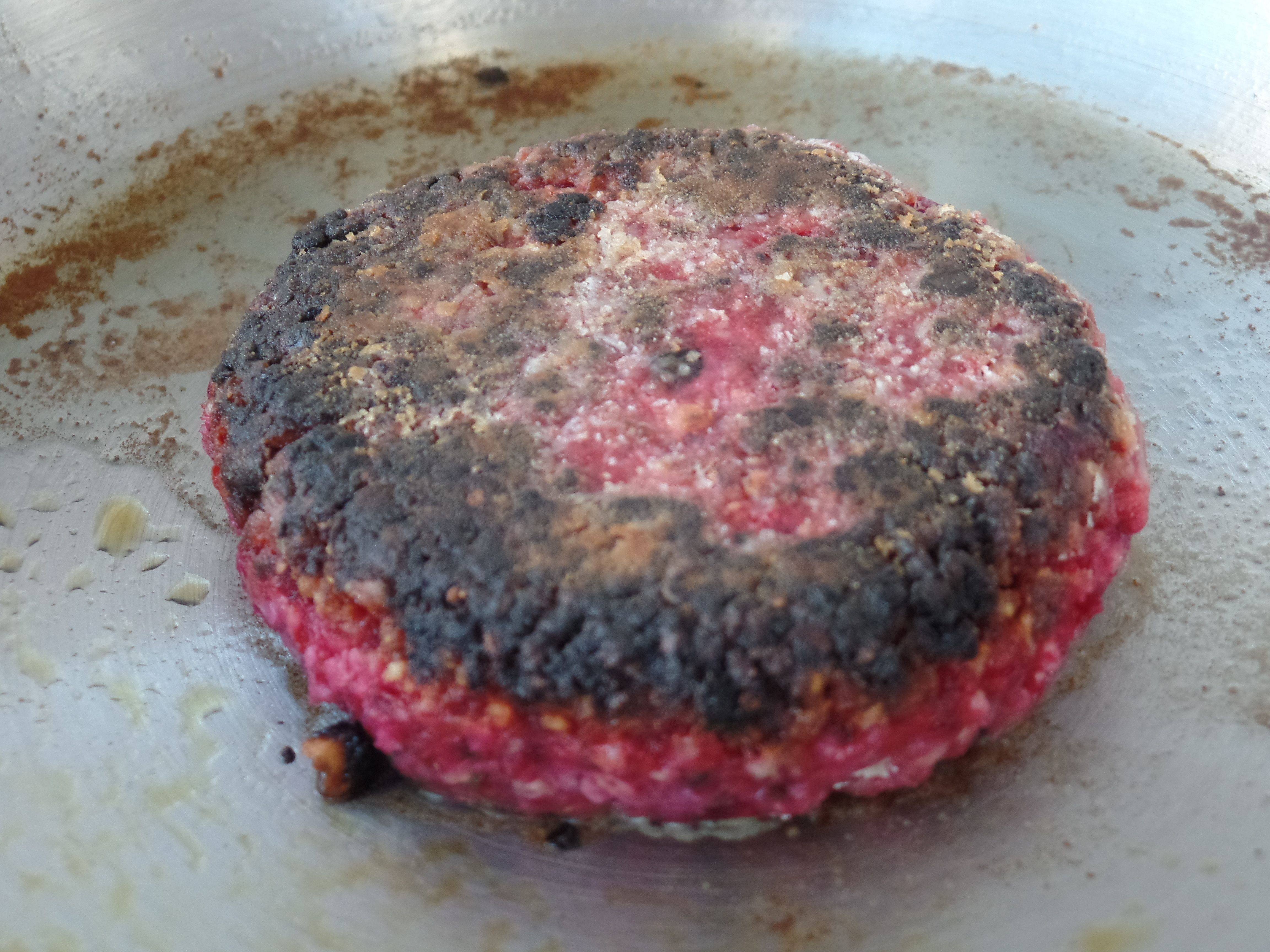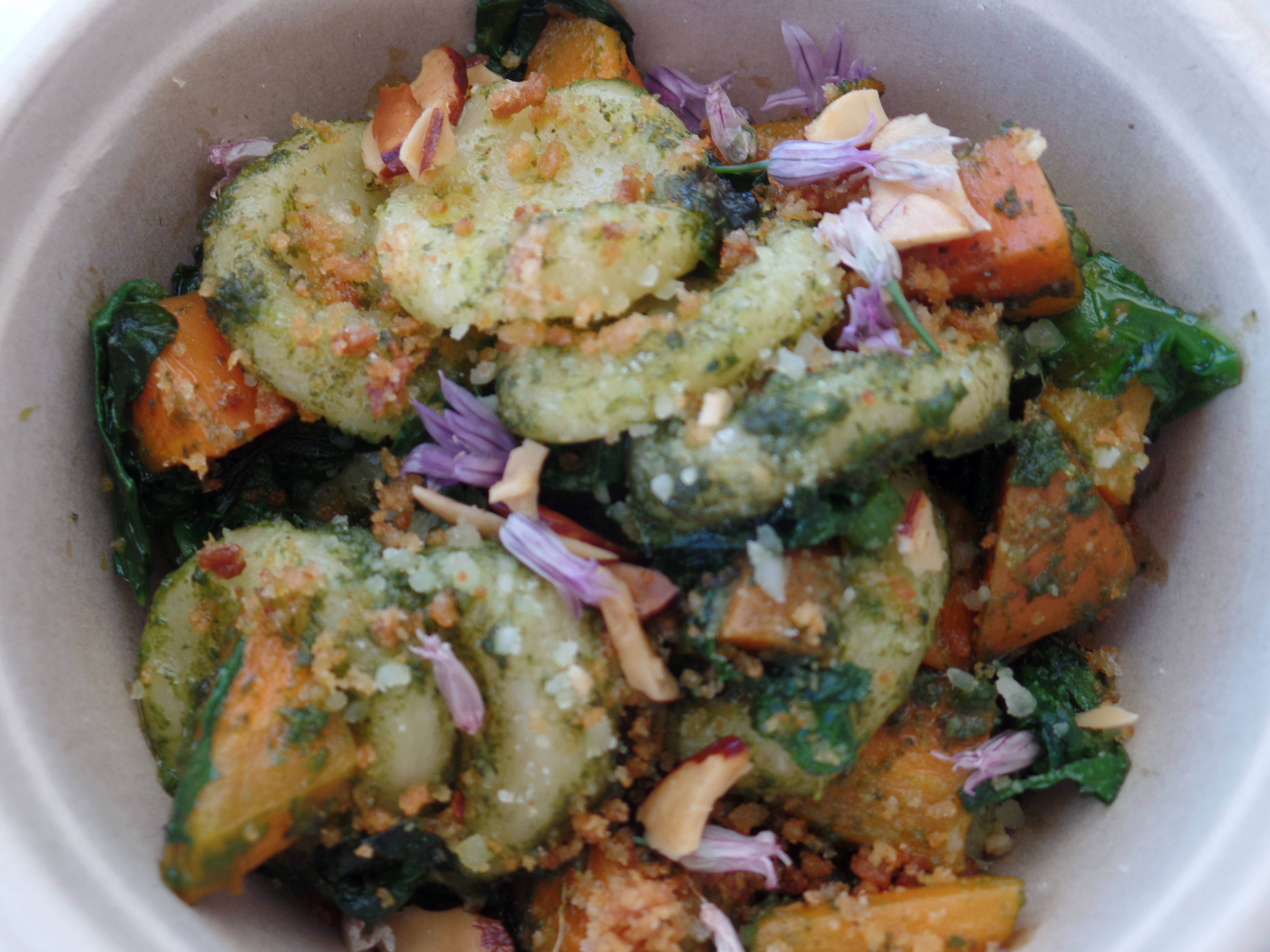Feeding The 5,000 In Portland, Maine
On Friday, October 7th, Portland, Maine became the 41st global city to reenact the biblical miracle of the loaves, feeding a 100-percent gleaned vegan vegetable stew to just under 5,000 people in and around Monument Square and the city. Tristram Stuart, who put on the first Feeding the 5,000 in London in 2009, sent members of his organization Feedback to help inaugurate the event along with City Mayor Ethan Strimling. Top Portland chefs gave cooking demos, schoolchildren presented thoughts on the worldwide food waste scandal, and Congresswoman Chellie Pingree, author of the Food Recovery Act, attended.
"Portland is the smallest city to have held this event," commented Representative Pingree, "reflecting a strong commitment to the traditional New England value of thrift. Our grandmothers were taught to waste nothing, so this is an easy idea to get behind."
The celebration in Portland featured a free lunch served to thousands made entirely from fresh food produce that would otherwise have gone to waste.
The waste of edible food is a growing global problem with social, environmental and economic consequences. Researchers have found that 40 percent of food grown for human consumption is never eaten. Wasted food costs a family of four about $1,500 a year, and Maine cities and towns spend an estimated $8.5 million to send more than 100,000 tons of food to landfills and incinerators. Meanwhile, food insecurity affects more than 200,000 Mainers, including one in four children.
Feeding the 5,000 events have taken place in 40 cities throughout France, Spain, Belgium, the Netherlands, the United Kingdom, Australia, and the United States, including New York City and Washington, D.C. (last spring). Feedback founder Tristram Stuart declares "We want to catalyze a food-waste revolution one person, one town, one country at a time, to take food waste 'off the menu' — helping to stop needless hunger and the environmental destruction of our planet."
"I am thrilled to be part of this day and I think it's appropriate that Maine is hosting this event," said Kristen Miale of the Good Shepherd Food Bank. "Maine is the perfect example of our nation's broken food system. Maine has an abundance of food — and not just like every other state with an abundance in our grocery stores and super stores — but we have an abundance of food in our fields and in the capacity of our land. Maine used to be an exporter of food and had little hunger. And now we are an importer of cheap food and have one of the highest rates of hunger in the United States. Maine ranks ninth in the US in food insecurity. One in four of our children are hungry. And we rank third in very low food security or chronic hunger — it's Mississippi, Louisiana, and then Maine. We can do better. We must do better."
"Fundamentally, our broken food system is caused by our prioritizing the wrong things," Miale continued. "We value the perfect tomato and having peaches year-round over the value of the local diversified family farm and the value of a community food system that recognizes that those who grow the food should be able to afford it. But I believe we can change that and today is a great start. I am glad to be part of this day and look forward to reclaiming our food system so that we can have robust communities, sustain our environment, and insure everyone has dignified access to healthy food."
"Wasting money to buy and dispose of food that we don't eat makes no sense, and the true cost of food waste is even higher," explained Sarah Lakeman, Sustainability Director for the Natural Resources Council of Maine. "Wasting food also wastes all of the energy, water, land, time, and money used to grow, transport, and process that food."
Cumberland County Food Security Council, Healthy Acadia, and the Natural Resources Council of Maine teamed up to organize over 250 volunteers to collect and prepare 4,000 pounds of vegetables from fields and farms from Ellsworth to Cape Elizabeth during the week-long build up to the event.
Alex Miale, 13, and Kevin Finn, 14, of Kennebunk Middle School pointed out that the US wastes 60 million tons of edible food annually, enough to fill the Rose Bowl daily, and more than the weight of 164 Empire State Buildings.
The vegetables stewed and served in Portland were gleaned from farms such as Penobscot's organic King Hill Farm, where Amanda Provencher and Paul Schultz raise everything from kale to cattle and spend a certain amount of time discussing the ironies and vagaries of the marketplace. "You see this row of kale?" asked Amanda. "Once we've moved on to another bed of greens, the second- and third-growth kale becomes available for gleaning. There is absolutely nothing wrong with it; as it gets colder it gets coarser, but also sweeter."
Penny Jordan of Jordan's Farm also blamed the quest for perfection for a large percentage of food waste. "We need to find ways to take advantage of food left in the fields by selling it at a lower price or donating it to programs promoting food security."
Another cause of food waste, explained Kristen Miale, are sell-by dates that have nothing to do with food safety or health issues but reflect resupply and logistical considerations.
Chef and author Malia Dell, author of Food that Works: Real Meals to Survive the 9 to 5, gave a cooking demo featuring salads prepared, stored, and consumed in mason jars — handy for health and nutrition in the workplace. "These are reverse salads with the wet part, the dressing, at the bottom of the jar. Whisk it up, and then add your ingredients: gleaned beets, local corn, walnuts, green beans, chopped apples, and, at the top, the greens. Shake it up and you're ready to go...a rainbow of color in a jar, which you take home and use again, your free Tupperware."
David Levi, chef at Portland's Vinland and Rossobianco, and Inunnguaq Hegelund, chef and chief forager at his restaurant Ulo in Llulissat, Greenland (located 220 miles north of the Arctic Circle with a population of 4,541, the third-largest city in Greenland) discussed "No Waste Cooking," a founding principle at Vinland where Levi is known for using foraged and local products and throwing away nothing. "The thrill of foraging and hunting is partly that you never really know what you're going to get, so you treasure it all and waste nothing," explained Hegelund, using a seal as an example. "Using wild ingredients connects us with our environment."
TV host, chef, and author Toni Fiore, as part of her cooking demo on "delicious vegan recipes using odds and ends," prepared a Dan Barber-esque millet beet burger that credibly impersonated a beef burger in color and texture. "I'm a strong believer in food being a tactile as well as a taste experience," she said.
Click here for Toni Fiore's millet beet burger recipe.
Mike Wiley and Andrew Taylor, co-chefs at the Portland restaurants Hugo's, Eventide, and The Honeypaw, presented a demonstration entitled "Using the Whole Fish" by making a chowder using a whole cod, including parts that might normally be discarded. "Heads and fins are collagen-rich and make the difference between a stew and a thin soup," explained Wiley. "A chowder should not generate waste. If it does, you're probably doing something wrong."
Kyle Foley of the Gulf of Maine Research Institute offered remarks under the heading "Plenty of Underloved Fish in the Sea" and recommended asking for fish other than the "ground fish," such as cod and haddock. "We import 91 percent of our fish to Maine, which is tragic considering that there are other species in the Gulf of Maine such as Atlantic pollock, Acadian redfish, dogfish, whiting, and mackerel out there for the taking."
Journalist and cook Christine Burns Rudalevige demonstrated a soup made of roasted farmer's market seconds. "The scraggly-looking, extra-ripe, maybe slightly bruised produce that doesn't quite make the farmers market grade but is still absolutely edible [is] perfect for jams, soups and sauces and sold at a good discount," she said. "You chop and roast these fruits and vegetables to intensify their flavors and then purée them to a pulp to finish the soup. They needn't be picture perfect before going into the pot."
Ilma López and Damian Sansonetti of the prestigious Portland restaurant Piccolo gave the day's final cooking demo, entitled "Cooking with Forgotten Greens." Sansonetti, previously chef de cuisine at Daniel Bouloud's Upper West Side Bar Boulud in Manhattan, effortlessly turned out a couple of dozen handmade orecchietti to go with a pesto sauce based on turnip tops and garlic scapes. The orecchietti were rustic and chewy, while the bright green pesto was fragrant and surprisingly basil-free.
In one of the day's final events, students from Peaks Island Elementary and King Middle School reported on "share tables," where students exchange lunch items or offer them to hungrier schoolmates. The final and most diminutive speaker took issue with the idea of throwing things away: "What is away, anyway? We live in away!" He closed with a rousing, "Join the food waste revolution!"
Chef Ron Adams, currently of Maine Farm and Sea Cooperative, previously Food Service Director at Portland Public Schools, gave the final count of 4,692 people served between Monument Square and different satellite points around Portland, including the University of Southern Maine. The soup was prepared in a total of seven kitchens, including Fork Food Lab, where chef Will Beriau worked to produce back-up soup, and Monument Square, where Ilma Lopez worked to refill the chafing dishes and get the soup on the tables.
The vegan vegetable stew was also a big success, taste-wise: hot, thick, eclectic and very spicy without being picante.



